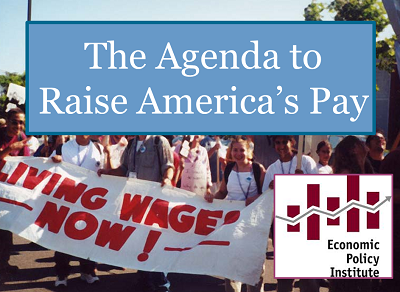 Our colleagues at the Economic Policy Institute (EPI) note that “wages for the vast majority of American workers have stagnated or declined since 1979—and wage stagnation’s reach has broadened over the last dozen years to include college-educated workers.” To address this extensive and growing income inequality EPI has proposed The Agenda to Raise America’s Pay. EPI identifies 11 steps for policymakers to consider:
Our colleagues at the Economic Policy Institute (EPI) note that “wages for the vast majority of American workers have stagnated or declined since 1979—and wage stagnation’s reach has broadened over the last dozen years to include college-educated workers.” To address this extensive and growing income inequality EPI has proposed The Agenda to Raise America’s Pay. EPI identifies 11 steps for policymakers to consider:
- Raise the minimum wage. Increasing the minimum wage to $12 per hour by 2020 “would benefit about a third of the workforce directly and indirectly.”
- Update overtime rules. “If we move the threshold to the value it held in 1975—roughly $51,000 today—we would provide overtime protections to 1 million more workers.”
- Strengthen collective bargaining rights. “The single largest factor suppressing wage growth for middle-wage workers over the last few decades has been the erosion of collective bargaining, which has affected both union and nonunion workers alike.”
- Reform immigration rules to regularize undocumented workers. ““Undocumented workers are vulnerable to exploitation by unscrupulous employers . . . Regularizing undocumented workers will not only lift their wages, but will also lift wages of U.S. workers in the same fields of work.”
- Provide earned sick leave and paid family leave. Providing earned sick leave would “assist workers and their families in achieving a better balance between work and family and . . . help to raise workers’ pay—and would give them more economic security.”
- End discriminatory practices that contribute to race and gender inequalities. Enforcing antidiscrimination laws and assuring greater transparency in the decision-making process s will help to ensure that workers can effectively pursue any violations of their rights.
- Support strong enforcement of labor standards. Too many employers fail to pay minimum wage or overtime, protect employees from workplace hazards, pay payroll taxes or worker’s compensation premiums, or provide family and medical leave. “Wage theft alone costs employees tens of billions of dollars a year, and lack of worker’s compensation coverage, unemployment insurance coverage, or Social Security coverage can cost them billions more.”
- Make very low rates of unemployment a priority when setting monetary policy. “Policymakers should not seek to slow the economy until growth of nominal wages (wages unadjusted for inflation) is running comfortably above 3.5 percent (which is consistent with ongoing productivity growth of 1.5 percent and a target inflation rate of 2 percent).”
- Enact targeted employment programs and undertake public investments in infrastructure to create jobs. “We need policies that can direct jobs to particular areas that suffer from high unemployment even when the national labor market is largely healthy . . . Additionally, undertaking a sustained (for at least a decade) program of public investment can create jobs, raise our productivity, and spur economic growth.”
- Reduce our trade deficit by stopping destructive currency manipulation. “Eliminating currency manipulation could reduce the U.S. global trade deficit by between $200 billion and $500 billion each year, which could increase overall U.S. GDP by between $288 billion and $720 billion and create between 2.3 million and 5.8 million U.S. jobs.”
- Use the tax code to restrain top 1 percent incomes. Options available to policymakers include eliminating executive pay tax preferences, tying their use to the firm giving wage increases equal to productivity growth, linking corporate tax rates to the ratio of executive pay to median worker pay, and higher top marginal tax rates to reduce the incentive for financial-sector professionals and corporate managers to rig markets or suppress wage growth.
EPI’s agenda may seem ambitious, but the challenge it addresses is daunting and growing worse as policymakers fail to act. Progress toward any of these goals would have measurable effects upon the prosperity and economic security of millions of middle- and low-income American families.


